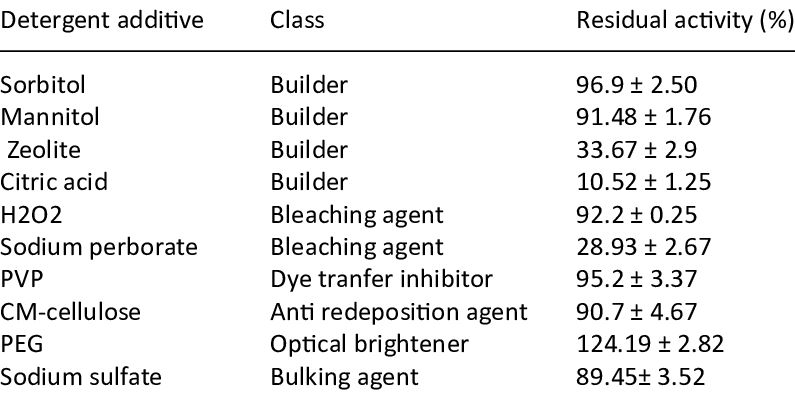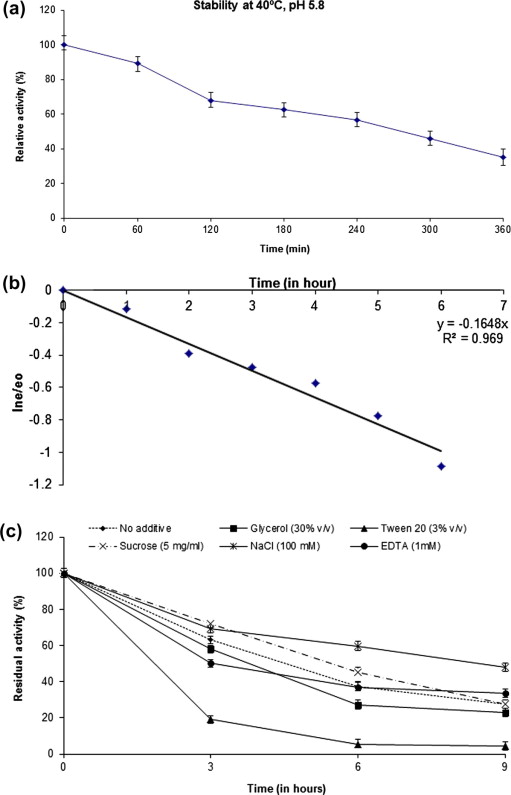Studying enzyme stability and the role of additives is important in both biotechnology and biochemistry. Enzymes, which act as catalysts for biochemical reactions, are affected by temperature, pH levels, and additives. Keeping them stable is key for their use in industries like biotechnology, pharmaceuticals, and food production. Because enzymes have many applications, it's crucial to keep them stable under different conditions. As such, researching how to improve enzyme stability and the role of additives is necessary. This research benefits not only theoretical understanding but also practical applications, where enzyme stability can improve the efficiency of biochemical processes.
 Effect of various detergent additives on enzyme stability of purified β-mannanase from P. thiaminolyticus (Tobias Heck, et al., 2012)
Effect of various detergent additives on enzyme stability of purified β-mannanase from P. thiaminolyticus (Tobias Heck, et al., 2012)
Service Process
Our service for examining the stability of enzymes and the influence of additives is comprehensive, thorough, and robust. Here's a detailed breakdown of each stage to give you a clearer understanding of our process:
- Initial Consultation: We start by conducting a detailed consultation with you. This consultation is in-depth and aims to gain a full understanding of your specific requirements, goals, and expectations. We also take the opportunity to answer any questions you may have and discuss the potential strategies we can employ to meet your needs.
- Experimental Design: Once we have a grasp of your needs, our team of experts moves on to the experimental design stage. In this phase, we develop a customized approach tailored specifically to your project. We carefully consider the unique aspects of your project and design experiments that will provide the most relevant and useful data.
- Enzyme Stability Testing: The next stage involves conducting enzyme stability testing under a wide variety of conditions. We recognize that different factors can significantly impact the performance of enzymes. Therefore, our testing process is designed to provide comprehensive insights into how different conditions, including temperature, pH levels, and the presence of various additives, influence enzyme stability.
- Data Analysis: After we've conducted the testing, we move on to the data analysis phase. This step is meticulous and thorough. Our team interprets the results using advanced statistical methods to ensure accuracy and reliability. We strive to draw meaningful conclusions that will provide valuable insights for your project.
- Report Preparation: The final stage of our process is the preparation of a detailed report of our findings. This report is comprehensive and provides an overview of our work and the results obtained. It's designed to give you a full understanding of the stability of your enzymes and the impact of various additives. It includes not only the raw data but also our interpretations and conclusions, providing you with the insights you need to move forward with your project.
Our goal is to provide you with the most thorough, accurate, and useful information about your enzymes and the impact of additives on their stability. If you have any questions, need more information, or would like to discuss a potential project, please don't hesitate to contact us. Our team is always eager to help and share our expertise.
Applications
| Application |
Description |
| Pharmaceutical Industry |
In pharmaceuticals, additives may be used as excipients in drug formulations to improve stability, solubility, or bioavailability. Enzyme stability is essential for the production of pharmaceuticals, including enzyme-based therapies and drug synthesis. |
| Food Industry |
Additives are commonly used in the food industry to enhance flavor, texture, shelf life, and color. Enzyme stability is crucial in food processing to maintain the efficacy of enzymes used for various purposes such as fermentation, clarification, and tenderization. |
| Biotechnology |
Additives are employed in biotechnology for various purposes such as cell culture, protein purification, and bioprocessing. Enzyme stability is vital in biocatalysis, where enzymes are used as catalysts for chemical reactions in industrial processes like biofuel production, pharmaceutical synthesis, and environmental remediation. |
| Agriculture |
Additives are utilized in agriculture for crop protection, soil conditioning, and animal feed formulation. Enzyme stability is important in agricultural applications for processes like enzyme-assisted extraction of bioactive compounds from plants and enzymes used in animal feed to enhance digestibility and nutrient absorption. |
| Textile Industry |
Additives find application in the textile industry for processes like dyeing, printing, and finishing, where they improve color fastness, durability, and appearance of fabrics. Enzyme stability is crucial in textile processing for tasks such as enzymatic desizing, bio-polishing, and denim finishing, where enzymes enhance fabric properties and reduce environmental impact compared to traditional chemical methods. |
| Cosmetics |
Additives are incorporated into cosmetic formulations for functions such as moisturizing, UV protection, and preservation. Enzyme stability is important in cosmetics for enzymatic treatments like exfoliation, anti-aging, and skin brightening, offering gentle and effective alternatives to chemical-based products. |
| Environmental Remediation |
Additives are applied in environmental remediation for tasks such as soil stabilization, wastewater treatment, and oil spill cleanup. Enzyme stability is critical in bioremediation processes, where enzymes break down pollutants into harmless substances, contributing to the restoration of contaminated ecosystems. |
Case Study
Nitrile metabolizing enzymes hold significant industrial promise, enabling selective bio-transformation of nitriles and surface modification of synthetic polymers in gentle reaction environments. The figure illustrates both nitrile metabolizing enzyme stability and the impact of additives. (a) Stability of nitrile metabolizing enzyme in 100 mM phosphate buffer at 40 °C, pH 5.8. (b) Plot for the determination of half-life (Kd = slope of ln e/e0 vs. Time). (c) Effect of additives on nitrile metabolizing enzyme activity (100% activity was assumed as the total activity from dry cell weight of cells and it corresponds to 75.67 ± 3.24 IU/g).
 Enzyme stability and effect of additives (Vikash B. and Bijan C., 2013)
Enzyme stability and effect of additives (Vikash B. and Bijan C., 2013)
FAQs
Here's a compilation of Frequently Asked Questions (FAQs) and their answers about enzyme stability, the impact of additives, and their significance in various processes. If you have more specific or detailed questions, don't hesitate to get in touch with us directly.
Q: What exactly does enzyme stability mean?
A: Enzyme stability refers to the ability of an enzyme to maintain its structural integrity and functionality under different conditions. This stability is a key factor in the effective use of enzymes in various industrial processes, as it ensures that the enzymes can consistently perform their catalytic functions.
Q: Why is the study of enzyme stability crucial?
A: The study of enzyme stability is vital because it allows us to optimize the conditions for enzyme activity, a key concern in numerous industrial and biotechnological applications. Understanding enzyme stability can lead to maximized efficiency and effectiveness in these processes, leading to cost savings and improved product quality.
Q: How do additives influence enzyme stability?
A: Additives can significantly enhance enzyme stability. They function by protecting enzymes from denaturation, which is a process that can damage the enzyme's structure and subsequently its function. By preventing this denaturation process, additives can ensure that enzymes continue to function effectively, enhancing the overall efficiency of the chemical processes they catalyze.
Q: What methods can increase the stability of an enzyme?
A: The stability of an enzyme can be increased by optimizing certain conditions such as temperature and pH, and also by using specific additives. These methods help preserve the enzyme's structure and function, increasing its longevity and effectiveness. This optimization process can involve detailed scientific testing and analysis to determine the ideal conditions for each specific enzyme.
Q: What factors can impact enzyme stability?
A: Several factors can affect enzyme stability. These include temperature, pH, and the presence of certain chemicals or additives. Each of these elements can alter the enzyme's structure and function, impacting its stability. Therefore, it's crucial to carefully control and monitor these factors to ensure optimal enzyme stability.
Q: What are the common additives used in enhancing enzyme stability?
A: Common additives include salts, sugars, and certain organic solvents. These can help protect the enzyme from denaturation and enhance its stability.
Q: What are the potential drawbacks of using additives?
A: While additives can enhance enzyme stability, they might interfere with enzyme activity if used excessively. It's important to find a balance that maximizes stability without compromising activity.
Q: How can one determine the optimal temperature and pH for an enzyme?
A: Determining the optimal temperature and pH typically involves testing the enzyme's activity at various temperatures and pH levels. The conditions where the enzyme shows the highest activity are considered optimal.
Q: Can the stability of an enzyme be improved through genetic modification?
A: Yes, genetic modification can be used to create enzyme variants with enhanced stability. However, this method is more complex and requires advanced biotechnological techniques.
Q: How do changes in enzyme stability affect industrial processes?
A: Changes in enzyme stability can greatly impact industrial processes. More stable enzymes can lead to more efficient processes, higher yield, and cost savings. Conversely, instability can lead to process inefficiencies and increased costs.

































 Effect of various detergent additives on enzyme stability of purified β-mannanase from P. thiaminolyticus (Tobias Heck, et al., 2012)
Effect of various detergent additives on enzyme stability of purified β-mannanase from P. thiaminolyticus (Tobias Heck, et al., 2012) Enzyme stability and effect of additives (Vikash B. and Bijan C., 2013)
Enzyme stability and effect of additives (Vikash B. and Bijan C., 2013)